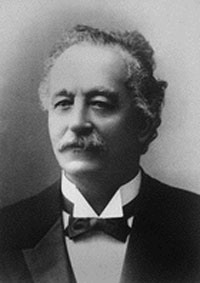Biography:Élie Ducommun
Élie Ducommun | |
|---|---|
 | |
| Born | |
| Died | 7 December 1906 (aged 73) |
| Relatives | Martin Brauen (great-grandson) |
| Awards | Nobel Peace Prize, 1902 |
Élie Ducommun (19 February 1833, Geneva – 7 December 1906, Bern) was a Swiss peace activist. He was a Nobel laureate, awarded the 1902 Nobel Peace Prize, which he shared with Charles Albert Gobat.[1]
Born in Geneva, he worked as a tutor, language teacher, journalist and a translator for the Swiss federal Chancellery (1869–1873).
In 1867 he helped to found the Ligue de la paix et de la liberté (League of Peace and Freedom), though he continued working at other positions, including secretary for the Jura-Simplon Steel Company from 1873 to 1891. That year, he was appointed director of the newly formed International Peace Bureau, the first non-governmental international peace organization, based in Bern. He refused to accept a salary for the position, stating that he wished to serve in this capacity solely for reasons of idealism. From 1895 he was made the director of Correspondance bi-mensuelle, journal of the International Peace Office.[2]
His keen organizational skills ensured the group's success. He was awarded in the Nobel Peace Prize in 1902, and served as director of the organization until his death in 1906.
See also
- List of peace activists
References
External links
- Miss nobel-id as parameter including the Nobel Lecture, 16 May 1904 The Futility of War Demonstrated by History
{{Navbox | name = Nobel Peace Prize laureates | state = autocollapse | bodyclass = hlist | title = Laureates of the Nobel Peace Prize | nowrapitems = yes
| group1 = 1901–1925 | list1 =
- 1901: [[Biography:Henry DunHenry Dunant / Frédéric Passy
- 1902: Élie Ducommun / Charles Gobat
- 1903: Randal Cremer
- 1904: Institut de Droit International
- 1905: Bertha von Suttner
- 1906: Theodore Roosevelt
- 1907: Ernesto Moneta / Louis Renault
- 1908: Klas Arnoldson / Fredrik Bajer
- 1909: A. M. F. Beernaert / Paul Estournelles de Constant
- 1910: International Peace Bureau
- 1911: Tobias Asser / Alfred Fried
- 1912: Elihu Root
- 1913: Henri La Fontaine
- 1914
- 1915
- 1916
- 1917: International Committee of the Red Cross
- 1918
- 1919: Woodrow Wilson
- 1920: Léon Bourgeois
- 1921: Hjalmar Branting / Christian Lange
- 1922: Fridtjof Nansen
- 1923
- 1924
- 1925: Austen Chamberlain / Charles Dawes
| group2 = 1926–1950 | list2 =
- 1926: Aristide Briand / Gustav Stresemann
- 1927: Ferdinand Buisson / Ludwig Quidde
- 1928
- 1929: Frank B. Kellogg
- 1930: Nathan Söderblom
- 1931: Jane Addams / Nicholas Butler
- 1932
- 1933: Norman Angell
- 1934: Arthur Henderson
- 1935: Carl von Ossietzky
- 1936: Carlos Saavedra Lamas
- 1937: Robert Cecil
- 1938: Nansen International Office for Refugees
- 1939
- 1940
- 1941
- 1942
- 1943
- 1944: International Committee of the Red Cross
- 1945: Cordell Hull
- 1946: Emily Balch / John Mott
- 1947: Friends Service Council / American Friends Service Committee
- 1948
- 1949: John Boyd Orr
- 1950: Ralph Bunche
| group3 = 1951–1975 | list3 =
- 1951: Léon Jouhaux
- 1952: Albert Schweitzer
- 1953: George Marshall
- 1954: United Nations High Commissioner for Refugees
- 1955
- 1956
- 1957: Lester B. Pearson
- 1958: Georges Pire
- 1959: Philip Noel-Baker
- 1960: Albert Lutuli
- 1961: Dag Hammarskjöld
- 1962: Linus Pauling
- 1963: International Committee of the Red Cross / League of Red Cross Societies
- 1964: Martin Luther King Jr.
- 1965: UNICEF
- 1966
- 1967
- 1968: René Cassin
- 1969: International Labour Organization
- 1970: Norman Borlaug
- 1971: Willy Brandt
- 1972
- 1973: Lê Đức Thọ (declined award) / Henry Kissinger
- 1974: Seán MacBride / Eisaku Satō
- 1975: Andrei Sakharov
| group4 = 1976–2000 | list4 =
- 1976: Betty Williams / Mairead Corrigan
- 1977: Amnesty International
- 1978: [[Biography:Anwar SaAnwar Sadat{{\}}Menachem Begin
- 1979: Mother Teresa
- 1980: Adolfo Pérez Esquivel
- 1981: United Nations High Commissioner for Refugees
- 1982: Alva Myrdal / Alfonso García Robles
- 1983: Lech Wałęsa
- 1984: Desmond Tutu
- 1985: International Physicians for the Prevention of Nuclear War
- 1986: Elie Wiesel
- 1987: Óscar Arias
- 1988: UN Peacekeeping Forces
- 1989: Tenzin Gyatso (14th Dalai Lama)
- 1990: Mikhail Gorbachev
- 1991: Aung San Suu Kyi
- 1992: Rigoberta Menchú
- 1993: Nelson Mandela / F. W. de Klerk
- 1994: Shimon Peres / Yitzhak Rabin / Yasser Arafat
- 1995: Pugwash Conferences / Joseph Rotblat
- 1996: Carlos Belo / José Ramos-Horta
- 1997: International Campaign to Ban Landmines / Jody Williams
- 1998: John Hume / David Trimble
- 1999: Médecins Sans Frontières
- 2000: Kim Dae-jung
| group5 = 2001–present | list5 =
- 2001: United Nations / Kofi Annan
- 2002: Jimmy Carter
- 2003: Shirin Ebadi
- 2004: Wangari Maathai
- 2005: International Atomic Energy Agency / Mohamed ElBaradei
- 2006: Grameen Bank / Muhammad Yunus
- 2007: Al Gore / Intergovernmental Panel on Climate Change
- 2008: Martti Ahtisaari
- 2009: Barack Obama
- 2010: Liu Xiaobo
- 2011: Ellen Johnson Sirleaf / Leymah Gbowee / Tawakkol Karman
- 2012: European Union
- 2013: Organisation for the Prohibition of Chemical Weapons
- 2014: Kailash Satyarthi / Malala Yousafzai
- 2015: Tunisian National Dialogue Quartet
- 2016: Juan Manuel Santos
- 2017: International Campaign to Abolish Nuclear Weapons
- 2018: Denis Mukwege / Nadia Murad
- 2019: Abiy Ahmed
}}
 |


